Related Research Articles
Kami are the deities, divinities, spirits, mythological, spiritual, or natural phenomena that are venerated in the Shinto religion. They can be elements of the landscape, forces of nature, beings and the qualities that these beings express, and/or the spirits of venerated dead people. Many kami are considered the ancient ancestors of entire clans. Traditionally, great leaders like the Emperor could be or became kami.
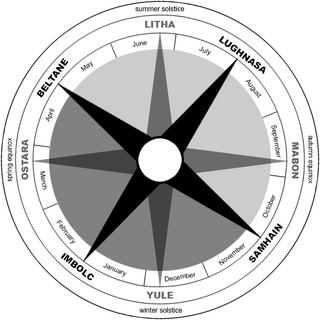
The Wheel of the Year is an annual cycle of seasonal festivals, observed by a range of modern pagans, marking the year's chief solar events and the midpoints between them. British neopagans crafted the Wheel of the Year in the mid-20th century, combining the four solar events marked by many European peoples, with the four seasonal festivals celebrated by Insular Celtic peoples. Different paths of modern Paganism may vary regarding the precise timing of each celebration, based on such distinctions as the lunar phase and geographic hemisphere.
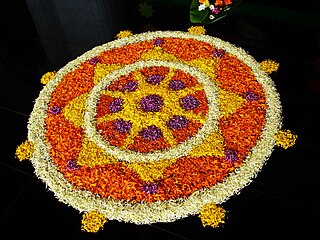
Onam is an annual harvest and cultural festival related to Hinduism that is celebrated mostly by the people of Kerala. A major annual event for Keralites, it is the official festival of the state and includes a spectrum of cultural events.

The Mid-Autumn Festival, also known as the Moon Festival or Mooncake Festival, is a harvest festival celebrated in Chinese culture. It is held on the 15th day of the 8th month of the Chinese lunisolar calendar with a full moon at night, corresponding to mid-September to early October of the Gregorian calendar. On this day, the Chinese believe that the moon is at its brightest and fullest size, coinciding with harvest time in the middle of autumn.
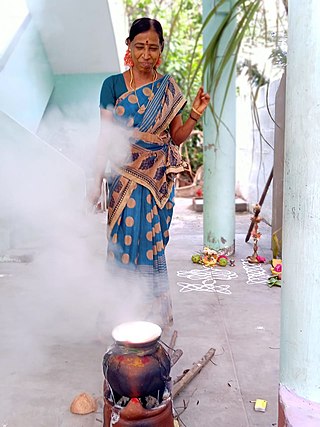
Pongal, also referred to as Thai Pongal, is a multi-day Hindu harvest festival celebrated by Tamils. It is observed in the month of Thai according to the Tamil solar calendar and usually falls on 14 or 15 January. It is dedicated to Surya and corresponds to Makar Sankranti, the Hindu observance celebrated under many regional names throughout the Indian subcontinent. The festival is celebrated over three or four days with Bhogi, Surya Pongal, Mattu Pongal and Kanum Pongal, observed on consecutive days.
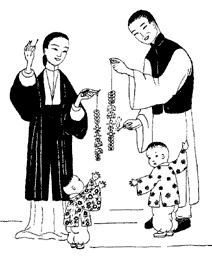
The Qingming Festival or Ching Ming Festival, also known as Tomb-Sweeping Day in English, is a traditional Chinese festival observed by ethnic Chinese in mainland China, Hong Kong, Macau, Taiwan, Malaysia, Singapore, Cambodia, Indonesia, Philippines, Thailand, and Vietnam. A celebration of spring, it falls on the first day of the fifth solar term of the traditional Chinese lunisolar calendar. This makes it the 15th day after the Spring Equinox, either 4, 5 or 6 April in a given year. During Qingming, Chinese families visit the tombs of their ancestors to clean the gravesites and make ritual offerings to their ancestors. Offerings would typically include traditional food dishes and the burning of joss sticks and joss paper. The holiday recognizes the traditional reverence of one's ancestors in Chinese culture.

The Ghost Festival or Hungry Ghost Festival, also known as the Zhongyuan Festival in Taoism and the Yulanpen Festival in Buddhism, is a traditional festival held in certain East and Southeast Asian countries. According to the Chinese calendar, the Ghost Festival is on the 15th night of the seventh month.

Obon or just Bon is a fusion of the ancient Japanese belief in ancestral spirits and a Japanese Buddhist custom to honor the spirits of one's ancestors. This Buddhist custom has evolved into a family reunion holiday during which people return to ancestral family places and visit and clean their ancestors' graves when the spirits of ancestors are supposed to revisit the household altars. It has been celebrated in Japan for more than 500 years and traditionally includes a dance, known as Bon Odori.

Wanouchi is a town located in Anpachi District, Gifu Prefecture, Japan. As of 1 April 2018, the town had an estimated population of 9,910 in 3,183 households and a population density of 439 persons per km2.The total area of the town is 22.33 square kilometres (8.62 sq mi).
Yukka nu hii is an annual festival of the Okinawa Islands of southwestern Japan, which is traditionally celebrated on the 4th day of the 5th month of the lunisolar calendar. It centers on the traditional dragon boat races. The festival dates back to circa 1400, where it is said to have been adopted from the Chinese. The dragon boat races are a form of giving thanks to the sea and agricultural gods and asking for their continued help for the future.

Jìngxiāng, shàngxiāng, bàishén, is a ritual of offering incense accompanied by tea and or fruits in Chinese traditional religion. In ancestral religious worship it's jìngzǔ or bàizǔ 拜祖. It is observed by a devotee holding joss incense with both hands in front of an altar during the worship. For greater reverence or devotion, the devotee will kneel and bow before the altar during and after placing the incense inside the urn at the altar.
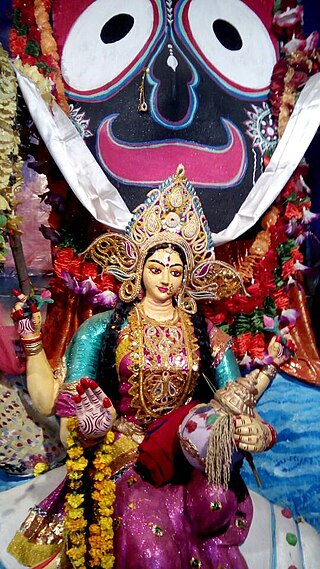
Lakshmi Puja is a Hindu occasion for the veneration of Lakshmi, the goddess of prosperity and the supreme goddess of Vaishnavism. The occasion is celebrated on the amavasya in the Vikram Samvat Hindu calendar month of Ashwayuja or Kartika, on the third day of Deepavali (Tihar) in most part of India and Nepal. In Assam, Bengal, and Odisha, this puja is celebrated five days after Vijaya Dashami.

The indigenous religious beliefs of the Tagbanwa people includes the religious beliefs, mythology and superstitions that has shaped the Tagbanwa way of life. It shares certain similarities with that of other ethnic groups in the Philippines, such as in the belief in heaven, hell and the human soul.
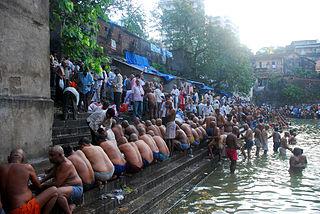
Pitru Paksha, also spelt Pitri Paksha, is a 16-lunar day period in the Hindu calendar when Hindus pay homage to their ancestors (Pitrs), especially through food offerings. The period is also known as Pitri Paksha/Pitr-Paksha, Pitri Pokkho, Sorah Shraddha, Kanagat, Jitiya, Mahalaya, Apara Paksha and akhadpak.

The Ryukyuan religion (琉球信仰), Ryūkyū Shintō (琉球神道), Nirai Kanai Shinkō (ニライカナイ信仰), or Utaki Shinkō (御嶽信仰) is the indigenous belief system of the Ryukyu Islands.

Seren Taun is an annual traditional Sundanese rice harvest festival and ceremony. The festival was originally held to mark the new agriculture year in the Sundanese ancient calendar as well as thanks giving for the blessings of the abundance rice harvest, and also to pray for the next successful harvest. Seren Taun demonstrates the Sundanese agricultural way of life, and is held in high regard in Sundanese traditional villages, as the festival draw thousands Sundanese villagers to participate as well as Indonesian or foreign visitors.
The Fetu Afahye is a festival celebrated by the chiefs and peoples of Cape Coast in the Central region of Ghana. The festival is celebrated on the first Saturday in the month of September every year. The Fetu Afahye is celebrated annually by the Oguaa people of Cape Coast because in the past there was an outbreak of disease among the people that killed many. The people prayed to the gods to help them to get rid of the disease. Thus the festival is celebrated to keep the town clean and to prevent another epidemic befalling the people.

Gaan-Ngai is a festival of the Zeliangrong people of Assam, Manipur and Nagaland states in North Eastern India. Gaan-Ngai is a festival of light, celebrating the victory of light over evil and the commemoration of the coming of light or fire. It is a post harvest festival celebrated to thank the God Tingkao Ragwang for a good harvest season and heralds the beginning of a new year. The festival is celebrated for five days with various rituals, prayers and festivities such as music, dance and feast accompanying the same.
Ryukyu New Year is a traditional New Year in the Ryukyu Islands. Japan fully uses the Gregorian calendar after the Meiji Restoration, but the Ryukyu Islands still celebrate the New Year on the first day of the first month of the lunar calendar.
References
The information in this article is drawn primarily from Festivals and Rituals of Okinawa, a site run by the Okinawa Prefectural government.